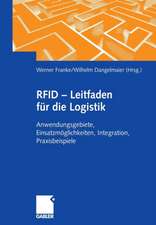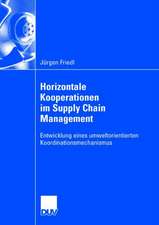Supply Chain Planning: Quantitative Decision Support and Advanced Planning Solutions
Editat de Hans-Otto Günther, Herbert Meyren Limba Engleză Hardback – 19 mar 2009
| Toate formatele și edițiile | Preț | Express |
|---|---|---|
| Paperback (1) | 949.55 lei 6-8 săpt. | |
| Springer Berlin, Heidelberg – 18 oct 2010 | 949.55 lei 6-8 săpt. | |
| Hardback (1) | 955.25 lei 6-8 săpt. | |
| Springer Berlin, Heidelberg – 19 mar 2009 | 955.25 lei 6-8 săpt. |
Preț: 955.25 lei
Preț vechi: 1164.93 lei
-18% Nou
Puncte Express: 1433
Preț estimativ în valută:
182.81€ • 190.15$ • 150.92£
182.81€ • 190.15$ • 150.92£
Carte tipărită la comandă
Livrare economică 14-28 aprilie
Preluare comenzi: 021 569.72.76
Specificații
ISBN-13: 9783540937746
ISBN-10: 3540937749
Pagini: 404
Ilustrații: X, 392 p. 77 illus.
Dimensiuni: 155 x 235 x 33 mm
Greutate: 0.73 kg
Ediția:2009
Editura: Springer Berlin, Heidelberg
Colecția Springer
Locul publicării:Berlin, Heidelberg, Germany
ISBN-10: 3540937749
Pagini: 404
Ilustrații: X, 392 p. 77 illus.
Dimensiuni: 155 x 235 x 33 mm
Greutate: 0.73 kg
Ediția:2009
Editura: Springer Berlin, Heidelberg
Colecția Springer
Locul publicării:Berlin, Heidelberg, Germany
Public țintă
ResearchDescriere
In recent years, supply chain planning has emerged as one of the most challenging problems in the industry. As a consequence, the planning focus is shifting from the management of plant-speci?c operations to a holistic view of the various logistics and productionstages, that is an approach in which suppliers, productionplants and customers are considered as constituents of an integrated network. A major dr- ing force behind this development lies in the globalization of the world economy, which has facilitated the co-operation between different partners working together in world-wide logistics networks. Hence, considerable cost savings can be gained from optimizing the structure and the operations of complex supply networks li- ing plants, suppliers, distribution centres and customers. Consequently, to improve the performance of the entire logistic chain, more sophisticated planning systems and more effective decision support are needed. Clearly, successful applications of supply chain management have driven the development of advanced planning systems (APS), which are concerned with s- porting decision-making activities at the strategic, tactical and operational decision level. These software packages basically rely on the application of quantitative methods, which are used to model the underlying complex decision problems c- sidering the limited availability of resources and the need to react on time to customer orders. The core module at the mid-term level of APS comprises op- ational supply chain planning. In many industries, productionstages are assigned to differentplantsand distribution centreshave been established at geographicallyd- persed locations.
Cuprins
Decision making in supply chains.- A framework for collaborative planning and state-of-the-art.- Simulation and optimization of supply chains: alternative or complementary approaches?.- Demand Management.- Revenue management and demand fulfillment: matching applications, models and software.- Active demand management for substitute products through price optimisation.- Customer segmentation, allocation planning and order promising in make-to-stock production.- Managing product availability in an assemble-to-order supply chain with multiple customer segments.- Inventory reservation and real-time order promising in a Make-to-Stock system.- Inventory Management.- Setting safety stocks in multi-stage inventory systems under rolling horizon mathematical programming models.- Supplier managed inventory in the OEM supply chain: the impact of relationship types on total costs and cost distribution.- Vendor-managed inventory and the effect of channel power.- Applications in the chemical industry.- Value chain management for commodities: A case study from the chemical industry.- MILP-based campaign scheduling in a specialty chemicals plant: a case study.- Applications in the automotive industry.- Supply chain planning in the German automotive industry.- Modeling and optimazing of strategic and tactical production planning in the automotive industry under uncertainty.
Textul de pe ultima copertă
Today supply chain management (SCM) is recognized as a powerful competitive weapon. This book addresses decision making activities in SCM at the strategic, tactical and operational decision level. It presents recent research results on collaborative planning in supply chains, demand and inventory management in logistics networks as well as applications in the chemical and automotive industry. The primary focus of this book is on the application of quantitative methods, which also form the basis of commercial advanced planning software systems. Its contributions are written by leading experts from academia and business. The book addresses practitioners as well as academic researchers in supply chain management, logistics and production planning.
Caracteristici
Includes supplementary material: sn.pub/extras

























